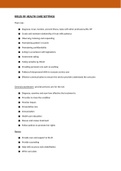ROLES OF HEALTH CARE SETTINGS
Their role:
● Diagnose, treat, monitor, prevent illness, liaise with other professional EG. BP
● Create and maintain relationship of trust with patience
● Observing, listening and responding
● Maintaining patient’s records
● Maintaining confidentiality
● Acting in accordance with legislations
● Assessment taking
● Taking samples eg. Blood
● Providing personal care such as washing
● Patience/interpersonal skills to reassure service user
● Effective communication to ensure the service provider understand the care plan
General practitioners- provide primary care for the sick
● Diagnose, examine and seen how effective the treatment is
● Prescribe to treat the condition
● Monitor impact
● Preventative care
● Immunization
● Health care education
● Discuss and review treatment
● Follow policies to promote her rights
Nurses
● Provide care and support to the ill
● Provide counseling
● Help with recovery and rehabilitation
● Write care plans
, ● Act as a patient’s advocate
Adult nurse
● Work with adults with physical health conditions
● Plan individualized care and carry out health procedures and treatment and evaluate their
effectiveness
● Run clinics programs on smoking and weight loss
Mental health nurse
● In hospital, community hospitals, health care centers, day care setting, residential homes
and prisons
● People with mental health problems are cared for in communities rather than hospitals
Paediatrics nurse
● Work with children, ensure social, cultural and family meets the needs of the children
Learning disability nurse
● Work with individuals who have learning disabilities
● Living in community rather than in hospitals. For example, schools, workplace, home,
residential setting promotion independency and maintaining their physical and mental
health
District nurse
● Care for people of all ages supporting them in their homes or residential homes.
● Work mainly with family members and other cares in order to access needs of the service
user and also their informal cares
● Also care for people who have been recently discharged from the hospitals
Neonatal nurse
● Work mainly with newborn babies and their parents, encouraging then to take a practical
role in their child’s care
Midwives
, ● Support woman through all stages of pregnancy providing antenatal (before birth) and
postnatal (after birth)
● Helping prepare for parenthood, delivering babies in maternity departments and homes
● Monitor and observe health of mother and babies
● Prepare and review patient care plan
● Provide support and advice
● Miscarriage, termination, neonatal death
● Liaising its other agencies to ensure continuity of care
● Provide information on caring about the baby and labour
Healthcare assistant
● Are trained to help with daily personal care and support wellbeing
● They work under the guidance of qualified professionals such as nurses or doctors
● Meet care needs such as washing, toiletries, making beds, feeding, mobility
● Monitor health by taking temperature, pulse, respiration rate and weight
● Deliver education on health
Occupational therapist
● Facilitate recovery and overcome practical barriers
● Treat injured, ill or disabled through the use of everyday activities
● Identify issues people may have in everyday life such as dressing or working
● Help people work out practical solutions
● Advice, coach, enable, rehabilitation
● Advice on home access such as specialised equipment
● Attend multi-disciplinary case meeting
Specialist practitioners are specialized in one field and develop their skills and have expert
knowledge.
Consultant- senior doctors who have specialized in their field of medicine
Cardiologist- heart
, Psychiatrist- mind/ mental health problems
Oncology- cancer
Paediatrics- children
Geriatrics- elderly
Neurologist- brain
Health care professionals are multi anti disciplinary which are formed based on individual specific
needs.
Multi-disciplinary- a combination of different specialists who work together. They are experts in the
field with the help of a degree
ROLES IN A SOCIAL CARE SETTING
Care manager
● Is responsible for running day to day residential care setting
● Care setting includes hospitals, support housing, homes of people who need nursing or help
with day to day living
● Supervising work of care assistants, ensuring quality of care meets standards and adheres to
relevant legislations




